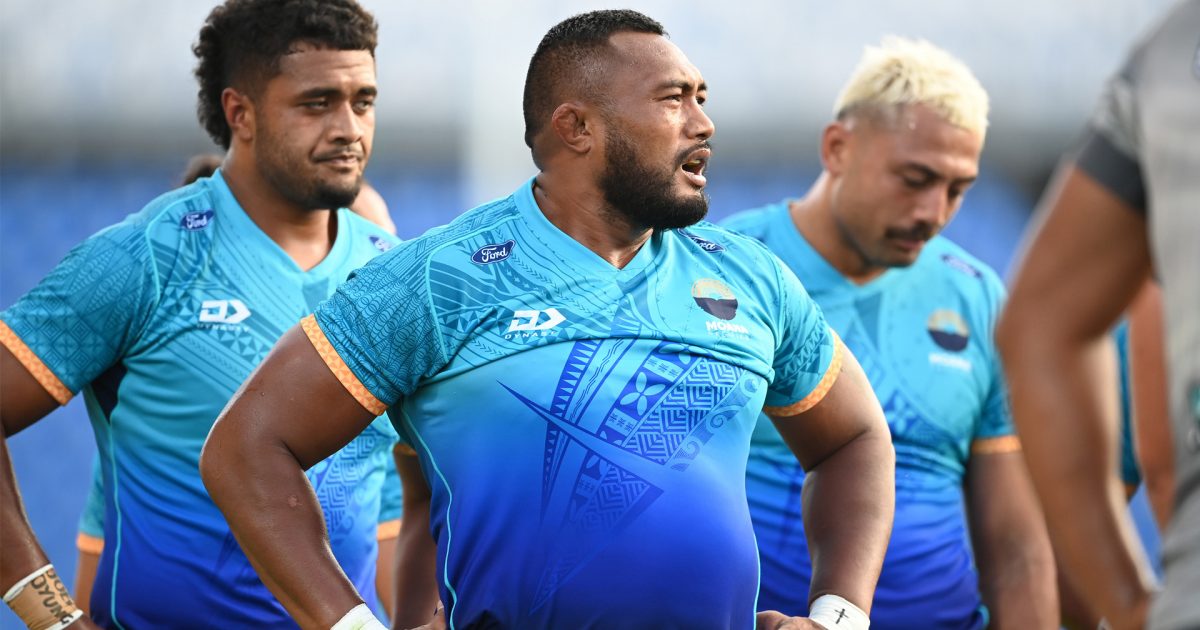Pre-season thumping likely the first of many for Super Rugby's expansion sides

If history is anything to go by, the upcoming season is going to be a trial by fire for new Super Rugby sides Moana Pasifika and Fijian Drua.
The Pacific Island nations have long justified inclusion in the Southern Hemisphere’s premier rugby competition and while there’s certainly some jubilation that justice has finally prevailed, the fact that it took so long for the new teams’ licenses to be granted for the coming season means they’re already starting out on the backfoot.
Drua head coach Mick Byrne recently told the Sydney Morning Herald that eight Europe-based players were set to sign for the team but ultimately had to commit their futures elsewhere, lest Super Rugby Pacific hadn’t been given approval.
It’s understood that Moana Pasifika ran into similar hurdles.
While the Drua have been able to call on a smorgasbord of internationals representatives from both the 7-man and XV-man games, Moana Pasifika have primarily populated their squad with New Zealand provincial players who had missed the cut elsewhere, along with a crop of experienced heads such as Sekope Kepu and Christian Leali’ifano.
In Moana Pasifika’s first pre-season match played over the weekend they were well and truly put to the sword by the Chiefs, suffering a hefty 61-7 defeat. Head coach Aaron Mauger suggested after the match that the team would be much better for their hit-out, with many of the players not used to the pace of Super Rugby, but it’s hard to envisage the side will fare much better come Super Rugby Pacific, given the Chiefs were playing without their 10 All Blacks.
The Drua, meanwhile, have so far only played an internal pre-season fixture.
Even overlooking the relative experience of the two new Pacific Island sides, history shows that expansions teams struggle in Super Rugby.
The competition has undergone significant chopping and changing over the last decade-and-a-half, with six new sides joining the fray throughout that time period.
The Western Force and the Cheetahs were the first additional teams, making their inaugural appearances in the 2006 season. The Force have never made it past the round-robin stages of the competition while the Cheetahs achieved that feat just once, in 2013. Similarly, just once apiece have those sides finished the year with a positive points differential.
In 2006, the Cheetahs managed a 10th place finish out of 14 teams while the Force came in dead last.
The Melbourne Rebels were the next cab off the ranks, and they also finished bottom of the latter in their inaugural season in 2011. Never have they finished higher than 9th on the ladder nor finished a season with a positive points for/against record.
When the Lions finished bottom of the South African sides in 2012, they were replaced the following year by the Southern Kings, who propped up the latter in their first season of Super Rugby. While the Kings dropped out in 2014 with the Lions earning their spot back in the competition, they eventually returned to Super Rugby where they continued their disappointing results and were eventually forced to play in the Pro14.
Alongside the Kings, the Jaguares and the Sunwolves joined the competition in 2016.
While the Sunwolves were a mishmash of Japanese representatives and foreigners who’d missed out on selection for their local Super Rugby clubs, the Jaguares were effectively comprised of the entire Argentina national side.
The Sunwolves’ results were abysmal over their four-and-a-half years in the competition, finishing second-to-last just once and bottoming out the ladder in their other three outings.
The Jaguares, on the other hand, eventually fought their way into the Super Rugby grand final in their last full year in the tournament. However, even they, with all the incredible players at their disposal, struggled to find their feet early on, finishing in the bottom half of the ladder in their first two seasons.
Moana Pasifika and Fijian Drua won’t have anywhere near the resources available to them as the Jaguares and like the other five Super Rugby expansion sides, will inevitably struggle in 2022 – probably more so, given the struggles with recruitment.
At least in the Drua’s case, they’ll start their season off with eight games against the comparatively weaker Australian sides and will quite probably manage to bank a few wins against the likes of the Waratahs and Rebels before having to take on the Kiwi teams.
The opposite is true for Moana Pasifika, of course, who will face the Blues, Chiefs and Crusaders in their opening three matches.
Despite the inevitable thrashings that will come the way of the expansion sides this year, however, the hope is that their inclusion will increase the standard of the competition in the future. The Pacific Islands’ addition to Super Rugby has been a long time coming and the season should be measured not necessarily on the results they achieve but on the fans they win over and the developments that take place off the field.


























Drua seems to have gotten a better draw and hopefully they adapt to the pace of super rugby before they meet the kiwi sides..here's to hoping the two sides improve with every game